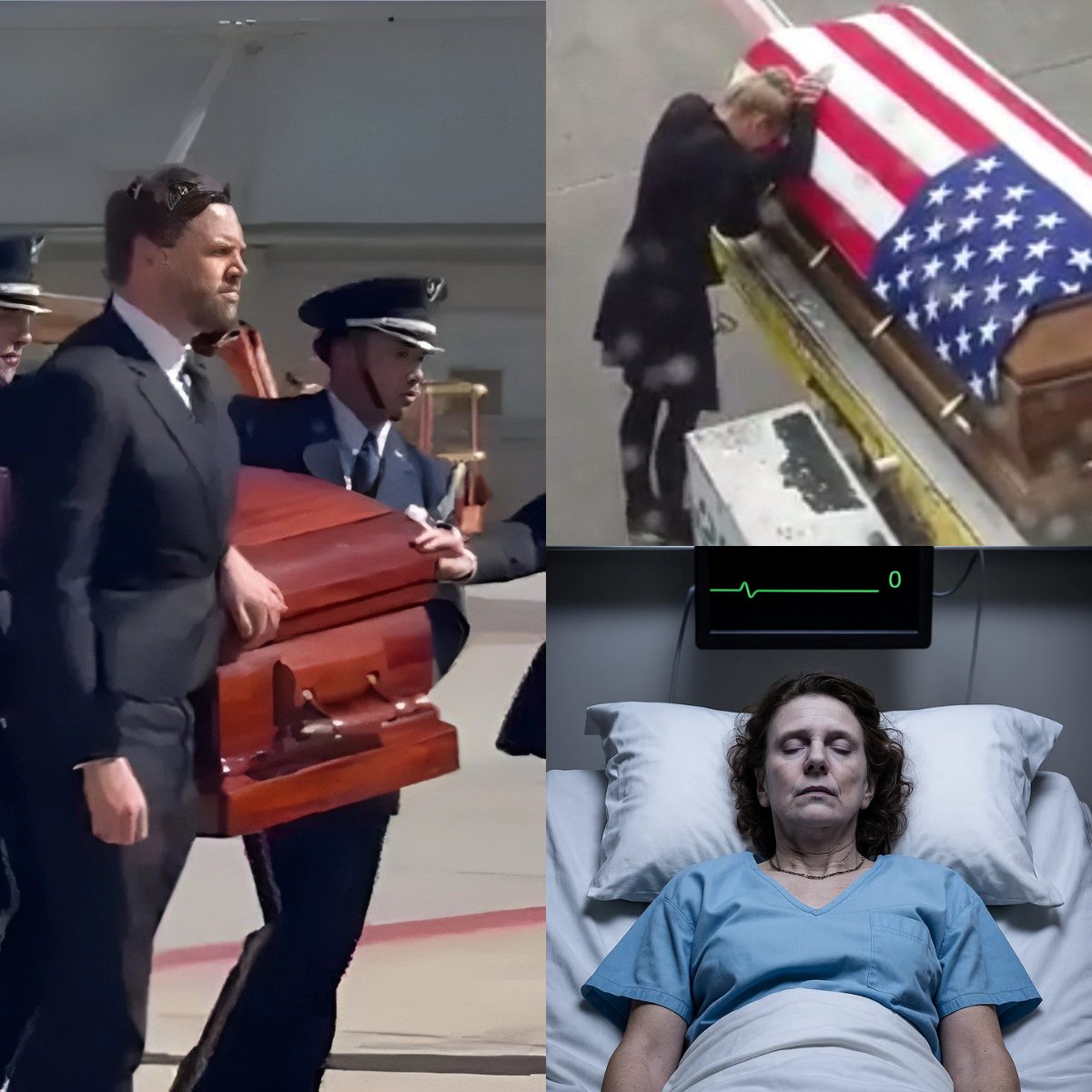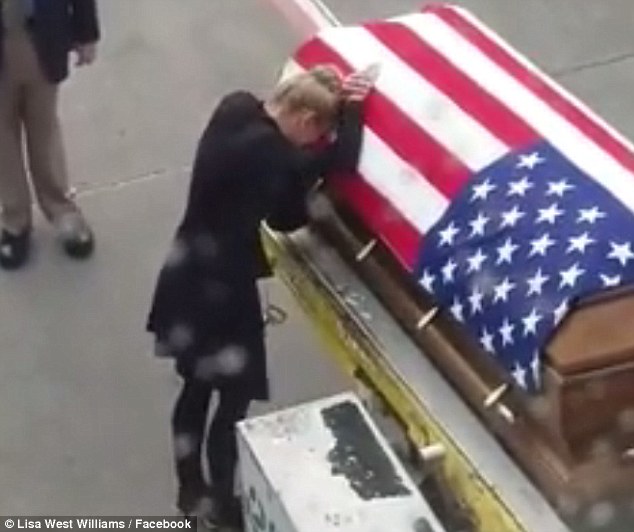AMERICA IN SHOCK: Charlie Kirk’s Mother Absent From Her Son’s Funeral — Family Members Reveal Her Current Condition, Leaving Everyone Heartbroken… In the moment when the entire nation wept while bidding farewell to Charlie Kirk, many were stunned to realize that the most important woman in his life — his own mother — was not present. Instead, a family member revealed in tears: “She is in a condition… no one could imagine. The pain was too much, it has left her…” The entire hall fell silent. The candles kept burning, but the absence of the mother cast an even darker shadow over the funeral. It is often said: “There is no greater pain than when a parent must bury their child.” But this time, the grief was too unbearable, to the point that his mother could not even step into the place where her only son’s coffin lay. What was revealed afterward left the entire nation speechless, with millions in tears…
In the heart of Glendale, Arizona, on September 21, 2025, State Farm Stadium—home to the roaring crowds of the Arizona Cardinals—transformed into a solemn cathedral of grief. The air was thick with the scent of white lilies and red roses, arranged in towering displays that flanked the polished mahogany casket at the center of the field. Thousands had gathered under the vast dome, their faces etched with disbelief, dressed in the somber hues of patriotism: deep reds, crisp whites, and unyielding blues, as per the poignant dress code set by Turning Point USA. Flags at half-mast fluttered outside, and inside, the massive screens that once broadcasted gridiron triumphs now looped silent montages of a young man’s fiery speeches, his quick wit slicing through the complacency of college auditoriums. Charlie Kirk, the 31-year-old conservative firebrand who had mobilized a generation of young voters, lay still, his life cut short by a single, senseless gunshot on the stage of Utah Valley University just eleven days prior. The nation watched, hearts heavy, as eulogies poured forth from the likes of President Donald Trump, Vice President JD Vance, and a chorus of allies who hailed him as a “giant of his generation.” But amid the tributes and the tears, a profound void lingered—one that cast a pall deeper than the tragedy itself. Charlie’s mother, Marlene Kirk, the woman who had cradled his dreams from the suburbs of Prospect Heights, Illinois, was nowhere to be seen.
The absence hit like a thunderclap in the hushed expanse of the stadium. As the organ swelled with “Amazing Grace,” and the congregation rose in unison, eyes scanned the front rows where Erika Kirk, Charlie’s widow, stood resolute beside their two young children, her face a mask of steely determination forged in the fires of loss. She had spoken earlier that week from the Turning Point headquarters in Phoenix, her voice steady yet laced with a widow’s fury: “You have no idea the fire you have ignited within this wife. The cries of this widow will echo around the world like a battle cry.” Flanking her were Kirk’s father, Gerry, an architect whose steady hands had built more than structures—he had laid the foundation for a son who would reshape American conservatism—and siblings who clutched faded photos of family Christmases, their whispers lost in the swell of hymns. Yet the seat reserved for Marlene, etched with a simple brass plaque reading “Beloved Mother,” remained conspicuously empty. Whispers rippled through the crowd like wind through wheat fields. “Where is she?” a mourner murmured to her companion, a young Turning Point volunteer whose red “Fight for Charlie” pin gleamed under the spotlights. The question hung, unanswered, until the moment of revelation that would shatter the fragile composure of all present.
It came during the family reflections, a segment meant to weave personal threads into the tapestry of Kirk’s public legacy. Gerry Kirk, his voice cracking like dry earth underfoot, stepped to the podium, adjusting his glasses with trembling fingers. Behind him, the jumbotron faded to black, leaving only the soft glow of memorial candles flickering in the aisles—each one lit by attendees in honor of the lives Charlie had touched through his “American Comeback” tours and relentless podcast broadcasts. “Charlie was our light,” Gerry began, his words measured, drawing from decades of quiet pride in a boy who skipped college to chase a vision of limited government and unapologetic faith. He spoke of Charlie’s childhood antics: the precocious debates at the dinner table over Ronald Reagan tapes, the summer camps where young Charlie organized mock elections among neighborhood kids. Laughter bubbled briefly, a fleeting warmth against the chill of loss. But then Gerry’s gaze drifted to that empty seat, and his composure fractured. He paused, swallowing hard, as if the words were thorns in his throat. A family member—Charlie’s aunt, Linda, a soft-spoken mental health advocate like her sister Marlene—rose unsteadily from the row behind, her tissue-dampened hands clasped in supplication. Tears carved rivers down her cheeks as she took the microphone, her voice a fragile bridge over an abyss of sorrow.
“She is in a condition… no one could imagine,” Linda choked out, the stadium falling into a silence so profound that the distant hum of air conditioning seemed a sacrilege. “The pain was too much. It has left her… broken, adrift in a sea of what-ifs and whys that no mother should ever navigate.” The words landed like stones in still water, rippling outward to engulf the assembly. Gasps echoed faintly; a child in the stands buried her face in her father’s jacket. Marlene, it was revealed, had not simply chosen absence. The unimaginable weight of burying her only son—after nurturing him through the skepticism of his early activism, celebrating his marriage to Erika in a sun-drenched Arizona ceremony, and beaming at the baptisms of her grandchildren—had precipitated a collapse of the spirit. In the days following the assassination, as the world mobilized with vigils from Washington D.C.’s Kennedy Center to makeshift memorials outside the U.S. Embassy in Pretoria, Marlene had retreated to the family home in Illinois. Reports, whispered first among close kin and later confirmed in tearful interviews, painted a portrait of devastation: sleepless nights haunted by the echo of that fatal shot, meals untouched on porcelain plates, and a once-vibrant woman now confined to her bedroom, her world shrunk to the four walls that had witnessed Charlie’s first steps. Doctors, consulted in hushed urgency, diagnosed acute grief syndrome, compounded by the hypertensive episodes that had plagued her since her days as a mental health counselor. “She can’t even look at his pictures,” Linda continued, her voice gaining a raw edge. “The coffin… the finality… it’s as if her heart refuses to accept what her eyes would confirm. There is no greater pain than when a parent must bury their child, but this? This is grief turned inward, a storm that devours from within.”
The hall—nay, the stadium—fell utterly silent then, the kind of quiet that amplifies the soul’s quiet screams. The candles kept burning, their flames dancing like defiant stars against the encroaching dusk of despair, but Marlene’s absence cast an even darker shadow over the proceedings. President Trump, who had arrived earlier on Marine One, his face unusually subdued beneath the brim of his signature cap, shifted in his seat, his hand resting briefly on Erika’s shoulder in a gesture that spoke volumes of shared resolve. He had already announced the posthumous Presidential Medal of Freedom for Charlie, calling him a “champion of liberty” whose death would not be in vain but a clarion call against “deranged” forces. Yet even the commander-in-chief seemed momentarily unmoored, his prepared remarks on Kirk’s role in the MAGA movement faltering as Linda’s confession lingered in the air. Vance, who had personally escorted the casket home on Air Force Two alongside Second Lady Usha, leaned forward, his Ohio drawl absent as he absorbed the human cost beyond the political martyr. Speakers who followed—NASCAR’s Austin Dillon, recounting how Richard Childress Racing honored Kirk with lap dedications; wellness influencers from Scottsdale who paused podcasts in tribute—wove their words around this central wound, their voices laced with a new layer of empathy. Outside, news vans from Fox to ABC clustered like mourners at a wake, broadcasting the scene to millions: a nation pausing mid-stride, from frozen yogurt shops in Idaho stamping “1993-2025” on red cups to prayer vigils in the shadow of the Grand Canyon.
What was revealed afterward left the entire nation speechless, with millions in tears streaming down faces glued to screens from coast to coast. In the weeks since that Utah stage, where 3,000 had cheered Charlie’s opening lines on faith and freedom before chaos erupted, investigations had unveiled a shooter radicalized in online echo chambers, a man whose mother’s own pleas—”He changed, more pro-gay and trans rights,” she lamented—underscored the divides Kirk had so fiercely bridged. But Marlene’s condition transcended politics; it was the primal howl of motherhood betrayed. As the service concluded with a rousing rendition of “God Bless America,” attendees filed past the casket, leaving notes of defiance: “Your voice lives on,” “Fight for the unborn, as you taught us.” Erika, gathering her children close, vowed to helm Turning Point, her battle cry a phoenix rising from ashes. Yet in quiet corners, whispers turned to resolve: support networks mobilized, counselors dispatched to Illinois, a GoFundMe surging past millions for Marlene’s care. America, ever resilient, wept not just for the fallen warrior but for the mother left in ruins—a reminder that behind every public icon beats a family’s fragile heart. In that shadow, unity flickered, raw and real, promising that from this heartbreak, a fiercer light might yet emerge. Charlie’s legacy, etched in policy and passion, now carried the weight of unspoken vows: to heal the unhealable, to stand where Marlene could not. The candles burned on, guardians of a grief too vast for words, as the dome lights dimmed, leaving only echoes—of laughter lost, of love enduring, of a nation forever altered.


